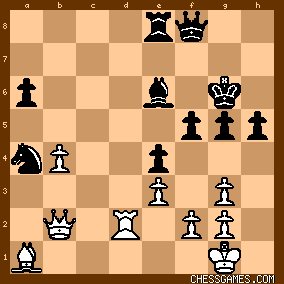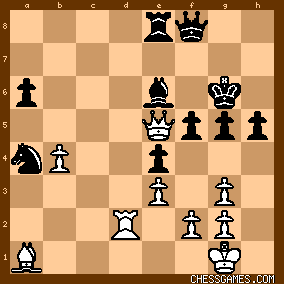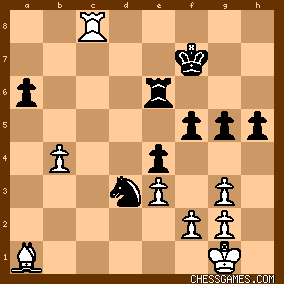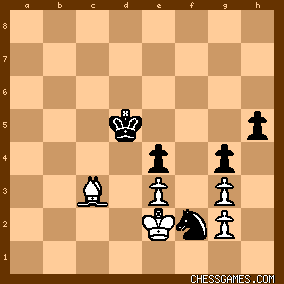|
< Earlier Kibitzing · PAGE 2 OF 2 ·
Later Kibitzing> |
| Mar-11-14 | | Petrosianic: Yes, the last time I looked at this, I believe that Black did blow a win right near the end. I should also comment on the decline of Chess Life/Chess Life and Review. Whereas for the 1977 Candidates, they'd had full coverage, with every game of every match fully annotated, their 1980 reporting was completely haphazard. They reported on the results of all the matches, somewhere or other. There was no "Candidates" coverage as such, things were strewn all over. The Polugaevsky-Tal match was summed up in Benko's column, for example, where he examined a couple of games. Other matches might have no games presented at all, only the final score. For Korchnoi-Petrosian, they did present all the games of the match, but totally unannotated, in a sidebar somewhere. For the Candidates Final, they did annotate all the games. But as you'll recall, there were two unfinished games. Chess Life reported that an adjudication of both games was likely, and promised to get back on that. They never mentioned it again, not even to tell us that the adjudication never happened. The retirement of Burt Hochberg, after October 1979, clearly marks the point at which Chess Life started going to the dogs. |
|
Mar-11-14
 | | perfidious: <Petrosianic: The retirement of Burt Hochberg, after October 1979, clearly marks the point at which Chess Life started going to the dogs.> Ah, how good were those early years as a member, with Mednis, Gligoric and Keres writing their columns and Evans typically having worthwhile stuff as well. In particular, I recall the 1977-78 candidates cycle as being well done by the magazine. |
|
| Mar-12-14 | | Granny O Doul: Just to join the chorus, the Hochberg Seventies were clearly the golden age at Chess Life. It's possible that Fischer Boom times gave them more cash flow, but yeah, dumb stuff like promising news and then forgetting about it is not blamable on bad economy. Most memorably forgetful was the Larry Parr-era "WHEN WE GET THE EVIDENCE [stress his], we will be naming names" (part of a story alleging widespread buying and selling of points in big American tourneys, never to be mentioned again, either in that specific article or for the rest of Parr's tenure at the helm). |
|
Mar-12-14
 | | perfidious: Had forgotten about that gem from Parr-wonder who got to him and killed the piece. |
|
| Nov-04-14 | | Howard: Yes, I remember that Parr piece. It was in reference to a last-round game between Adjoran and Alburt, at the 1985 New York Open. Parr stated that a win by Adjoran would have resulted in his winning some prize money, but Alburt was apparently out of the running already, as far as winning a decent amount of money. But in this game, "no deals were made" (as Parr put it), and Alburt ended up winning it. Thus, neither player won much (if any) prize money. |
|
| Nov-04-14 | | Howard: Incidentally, I remember that excellent 1977 coverage of the Candidates, too. |
|
| Apr-04-15 | | Howard: Now that I've reviewed the last several comments, I just noticed something. No one has specifically responded to my inquiry.. ....where did Petrosian blow the win ? |
|
| Apr-04-15 | | A.T PhoneHome: Out of curiosity... Would <44...Rxd8 45.Rxd8 Qe7> be a sound continuation for Petrosian? I mean why capture that a4 Rook when it's in such a bad spot anyway? Opinion would be nice! Thanks in advance ladies and gentlemen. |
|
| Apr-04-15 | | thegoodanarchist: <Howard:
....where did Petrosian blow the win ?>
Petrosian didn't blow the win in this game because there was no win. In fact, after move 40 these guys pretty much played like modern chess engines, top line moves, except for Korchnoi's 43. Nxc6?!. This move is dubious but Black's advantage is only about -0.76, not close to being decisive. After that, everything was accurate. I was quite impressed by the level of play. |
|
| Apr-04-15 | | A.T PhoneHome: So I assume that Black has no favourable exchanging scheme from, say, move 40 at any point? |
|
| Apr-04-15 | | thegoodanarchist: <A.T PhoneHome: So I assume that Black has no favourable exchanging scheme from, say, move 40 at any point?> Well, "favourable" and "winning" are of course two different things entirely, in most cases. |
|
| Apr-04-15 | | A.T PhoneHome: Hah, I guess that does it then. :P thank you sir <thegoodanarchist>! |
|
| Apr-06-15 | | Howard: I looked at the 1980 volume of British Chess Magazine yesterday, and it said that Petrosian's 43...Nb6 won a piece, but then he erred with 45...Re6. On the other hand, Informant gives Korchnoi's 44.Nd8 two explanation marks and doesn't say anything about Petrosian's having a win. I'll have to look at this game more closely....
Incidentally, BCM also said that Petrosian had a significant advantage in four straight games---4, 5, 6, and 7. Comments ? |
|
| Apr-06-15 | | A.T PhoneHome: <Howard> I'm admittedly a horrible chess player, but maybe 45...Bxe6 instead of 45...Rxe6 ?
I don't know how to continue though so... Go figure. :P But after 45...Bxe6: 
click for larger viewNow Queens don't go off like in the game. White moves Queen in this diagram. That Black Bishop can move to d7 if Queen goes near that Knight, guarding it. The point is that at least for this one move, White has to keep his play around first two ranks since now, 46.Rd8 just loses the Rook. I really don't know how to continue. But 45...Bxe6 (Queen moves) and I tried to play around with ideas regarding that Knight and if Black plays ...Rd8 or ...Rc8. I wish I was more qualified in this! |
|
| May-03-15 | | Howard: So, did Petrosian have a forced win or not ?!?
BCM says yes, while the Informant says "nyet".
Who's right ? |
|
| May-03-15 | | DrGridlock: Playing around with Komodo, White has a comfortable advantage until 43 Nxc6 (Qb3 keeps an advantage for White). After 43 Nxc6, the edge shifts to black, but there is no "forced win." 48 ... Kf7 is perhaps an improvement on black's play, but the difference is between about a -.2 eval (after Kf7), and -.03 eval (after Rb6). In particular, 45 ... Rxe6 (and not Bxe6) is the computer's preferred move. After 45 ... Bxe6, the computer likes 46 Qe5 for White: Viktor Korchnoi - Tigran Vartanovich Petrosian

click for larger view |
|
| May-11-16 | | Howard: Out of the four Candidates quarterfinals in 1980, this one intrigues me the most--but, then, I've always been partial towards Iron Tigran. |
|
| May-11-16 | | whiteshark: Queen's Gambit Declined Semi-Slav (D46) acc2 cb megabase |
|
| May-11-16 | | ewan14: Fascinating game. You can imagine the tension in the playing hall , especially with these 2 players |
|
May-11-16
 | | AylerKupp: <Analysis of the position after 43.Nxc6> (part 1 of 2) Since <DrGridlock> was playing around with Komodo, I decided to play around a little bit with Stockfish, just to get a different "opinion". From the position after 43.Nxc6

click for larger viewStockfish 7 at d=33 evaluates the following as Black's top 3 moves. Clearly Stockfish considers 43...Nb6 to be Black's best move in this position, but its evaluation indicates that there is no clear win in sight. 1. [-0.31] 43...Nb6 44.Nd8 Nxa4 45.Nxe6 Rxe6 46.Rd8 Nxb2 47.Rxf8 Nd3 48.Rxc8 Kf7<1> 49.Rc7+ Re7 50.Rc6 Rb7 51.Rf6+ Ke8 52.Kf1 a5 53.Rxf5 axb4 54.Rxg5 b3 55.Rxh5 b2 56.Bxb2 Rxb2 57.Rh4 Rxf2+ 58.Kg1 Kf7 59.Rxe4 Re2 60.g4 Kg6 61.Kh2 Ne1 62.Kh3 Rxg2 63.Rc4 Rg1 64.Rc1 Kf6 65.Rb1 Kf7 66.Rd1 Ke6 67.Rc1 <1> Here Stockfish deviates from Petrosian's 48...Rb6. Here is how it evaluates 48...Kf7 vs. 48...Rb6, Principal Variation (PV) only: <1a> Position after 48...Kf7 and Stockfish's PV:

click for larger view1. [-0.26], d=34: 49.Bd4 Nxb4 50.Rc7+ Kg6 51.Rg7+ Kh6 52.Rf7 Rc6 53.Rxf5 Kg6 54.Rf8 Rc1+ 55.Kh2 g4<1a1> 56.Rf6+ Kg5 57.Re6 Nd3<1a2> 58.Rxa6 Nxf2 59.Ra5+ Kh6 60.Ra6+ Kh7 61.Ra1 Rxa1<1a3> 62.Bxa1<1a4> Nd3 63.Kg1 Kg6 64.Bc3 Kf5 65.Kf1 Ke6 66.Ke2 Kd5 67.Kd2 Nf2 68.Ke2 Kc4<1a5> 69.Bg7 Nd3 70.Kf1 Nb4 71.Ke2 Nd5<1a6>

click for larger view<1a1> Now White's king is entombed but Stockfish as Black doesn't seem to be able to take advantage of it.

click for larger view<1a2> An odd choice to me from the perspective of trying to retain winning chances. Initially I thought that maybe 57...a5 was better, but then 58.Re5+ wins the a-pawn anyway. So Black might as well get something for its pawn. <1a3> Another odd choice to me but what alternatives does Black have? Not easy to try to attack White's only weakness, the Pg2. <1a4> Now a draw seems assured; all pawns on the same side of the board and the long range bishop should be able to hold its own against the short range knight in spite of Black's superior pawn structure. Plus White's king is no longer entombed.

click for larger viewI tried to have FinalGen analyze this position but it estimates that it will take it more than 60 hours and 1 TB of uncompressed disk space and I have neither the time, the patience, or the disk space. <1a5> Need to look at the consequences of 68...Nh1. I thought that after 69.Be1 the Pg3 is defended and the knight seems trapped.

click for larger viewThe best that Stockfish can come up with is the draw by repetition after 69.Be1 Kc4 70.Kd2 Kb5 71.Ke2 Kc4. But White wins if it tries to go after the knight even though it loses the Pe3 and Pg3: 70.Kf1 Kd3 71.Kg1 Nxg3 72.Bxg3 Kxe3, and per the Lomonosov tablebases White mates in 32 moves from this position after 73.Kf1 This line sort of reminds me of Fischer's infamous 29...Bxh2 in Spassky vs Fischer, 1972. |
|
May-11-16
 | | AylerKupp: <Analysis of the position after 43.Nxc6> (part 2 of 2) <1a6> Restarting the analysis from this position Stockfish evaluates the resulting position at [-0.22], d=56 after either 72.Kd2, 72.Be5, or 72.Bd4 plus who knows how many other moves. So there doesn't seem to be a win for Black from this position. And FinalGen unfortunately estimates that it would take it over 60 hours and 1 TB of uncompressed disk space to analyze it, so that's not a feasible approach for me. <1b> Position after 48...Rb6 and Stockfish's PV:

click for larger view1. [0.00], d=35: 49.Rg8+<1b1> Kf7 50.Rxg5 Rxb4 51.Rxf5+ Ke6 52.Rf6+ Ke7 53.Kh2 Rb1 54.Bd4 Rf1 55.g4 Nxf2<1b2> 56.Rxa6 h4<1b3> 57.Bf6+ Kd7 58.Bxh4 Nxg4+ 59.Kg3 Nxe3 60.Bg5 Nd5 61.Ra4 Ke6 62.Rxe4+<1b4> Kf5 63.Rd4 Kxg5 64.Rxd5+ <1b1> Stockfish immediately deviates from Petrosian's 49.Bc3. Maybe this is another case of "patzer sees a check, patzer gives a check". :-) <1b2> If 55...hxg4 Stockfish evaluates the position as effectively equal but very slightly in White's favor, [+0.14], d=35 after 56.Rxa6 Rxf2 57.Rg6 Rd2 58.Rxg4 Ke6 59.Bb6 Kd5 60.Rg7 Re2 61.Ba7 Ke6 62.Rg8 Ne5 63.Kh3 Nc4 64.Rg3 Kf6 65.Bd4+ Ke6 66.Kh4 Kf5 67.Kh5 Ke6 68.Kg5 Kd5 69.Kf5 Rf2+ 70.Kg6 Re2 71.Kf7 Ne5+ 72.Kg7 Kd6 73.Kh6 Ke6 74.Bb6 Kf5 75.Kh5 Nc4 76.Bc5 Ke6 <1b3> An odd-looking choice but 56...hxg4 transposes into a position similar to the <1b2> line which does not provide anything for Black. <1b4> This position is a tablebase draw, and so is the final position. So Petrosian's 48...Rb6, while perhaps not objectively as good as 48...Kf7, seems to lead to the same result. Stockfish's other top 3 moves for completeness and for indicating the relative superiority of 43...Nb6. I didn't bother to review them. 2. [+0.43]: 43...Nxe3 44.Ne5+ Rxe5 45.fxe3 h4 46.gxh4 f4 47.Rf2 Rf5 48.Ra5 f3 49.Rxf5 Bxf5 50.hxg5 Rd8 51.Qe5 Rd1+ 52.Kh2 Kxg5 53.Qf4+ Kg6 54.Bd4 Qe7 55.Qg3+ Qg5 56.gxf3 exf3 57.Qxg5+ Kxg5 58.Rxf3 Be4 59.Rf8 Rb1 60.Bc5 Rb2+ 61.Kg3 Rg2+ 62.Kh3 Re2 63.Rf4 Bd5 64.Kg3 Rg2+ 65.Kh3 3. [+0.76]: 43...Bb7 44.Na5 Nb6 45.Ra3 Bd5 46.Qd4 Qf7 47.Rc2 R8e7 48.Qd1 Rd6 49.Nc6 Rxc6 50.Rxc6+ Bxc6 51.Rxa6 Qd5 52.Qxd5 Bxd5 53.Rxb6+ Re6 54.Rb8 Re7 55.Rb5 Bc4 56.Rb6+ Re6 57.Rb7 Rd6 58.Bd4 Rd5 59.Rb6+ Kh7 60.Rf6 Be2 61.Rf8 g4 62.Rf6 Bb5 63.f4 exf3 64.gxf3 Be2 65.fxg4 fxg4 A well played game by both players |
|
| May-12-16 | | Granny O Doul: <Howard: Yes, I remember that Parr piece. It was in reference to a last-round game between Adjoran and Alburt, at the 1985 New York Open> Not quite. It referred to a game between Alburt and a student of his named Pelts (either Roman or Peter, I don't remember which, but there were two such human beings). As you say, had Alburt dumped the game, there would have been $ as his student would have won a class prize. |
|
| May-13-16 | | Howard: Are you absolutely sure about that, Granny O Doul? I don't have any of those back issues any more, but I would have almost SWORN it was between Alburt and Adorjan. |
|
| May-14-16 | | Retireborn: <Howard> Must be the game Peter Pelts-Alburt from the World open in Philadelphia 1985. Alburt did win a game from Adorjan at the New York open that year, but it was in the 5th round, not the last round. |
|
| May-15-16 | | Howard: Thanks! My memory is not always accurate, especially when it comes to games from 31 years ago. Besides, I looked at Informant 39 the other day, and judging from the final scores of Adorjan and Alburt, there's hardly any way they could have been paired in the last round of the NY Open, anyway. Incidentally, if I remember right (correct me if I'm wrong!), wasn't Alburt the sole leader at the World Open after five rounds?! |
|
 |
|
< Earlier Kibitzing · PAGE 2 OF 2 ·
Later Kibitzing> |
|
|
|





































